FLASHBACK to Crimea: Photos of the disputed Peninsular, 1854-2014
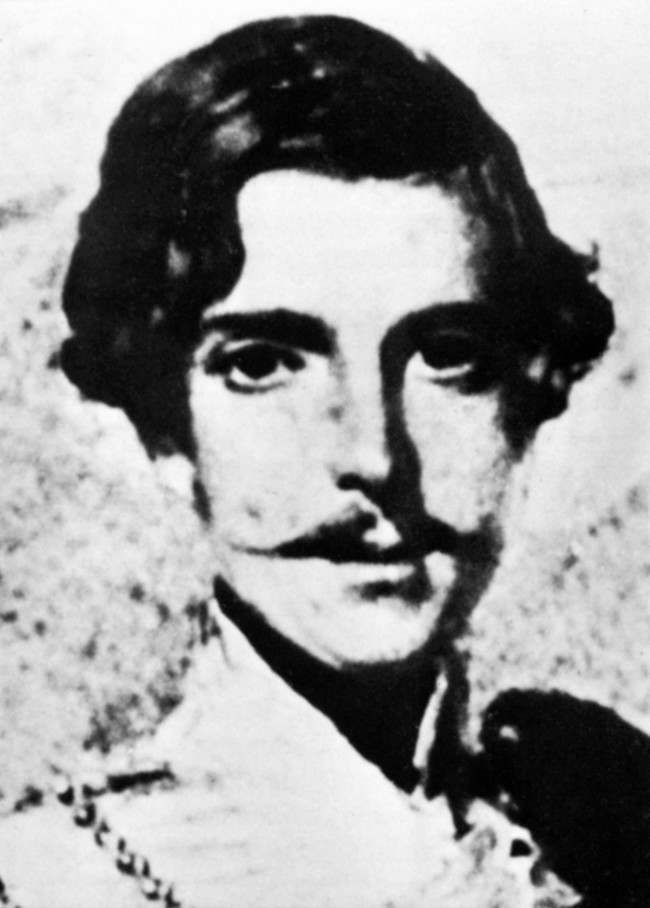
IMAGE OF CAPTAIN LOUIS NOLAN, THE STAFF GALLOPER WHO DELIVERED THE FATEFUL MESSAGE FROM LORD RAGLAN WHICH LED TO THE CHARGE OF THE LIGHT BRIGADE DURING THE CRIMEAN WAR. NOLAN WAS KILLED DURING THE CHARGE AGAINST RUSSIAN ARTILLERY NEAR BALAKLAVA IN 1854.
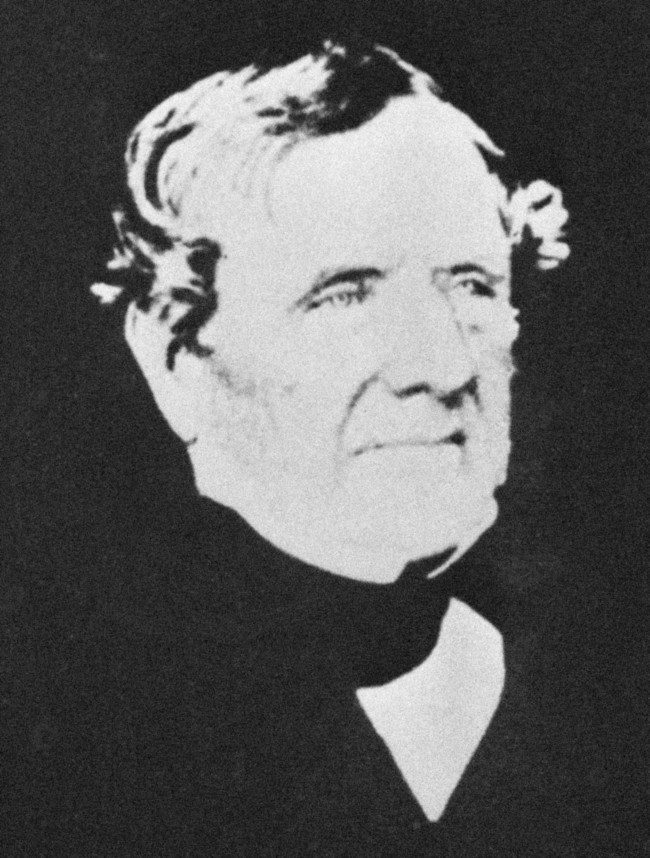
Copied portrait of Lord Raglan, commander of the British troops sent to the Crimea.
Date: 01/01/1855
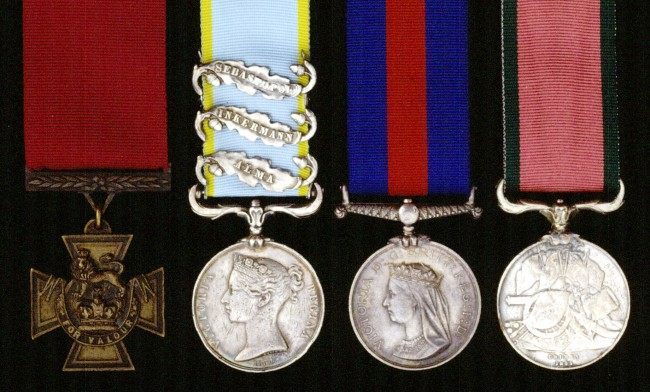
A rare Maori War VC Group of four medals belonging to Lieutenant-Colonel F A Smith, 43rd Light Infantry, late 1st Foot, (l/r) Victoria Cross, Crimea 7 three clasps, New Zealand reverse dated 1863 to 1864 and Turkish Crimea
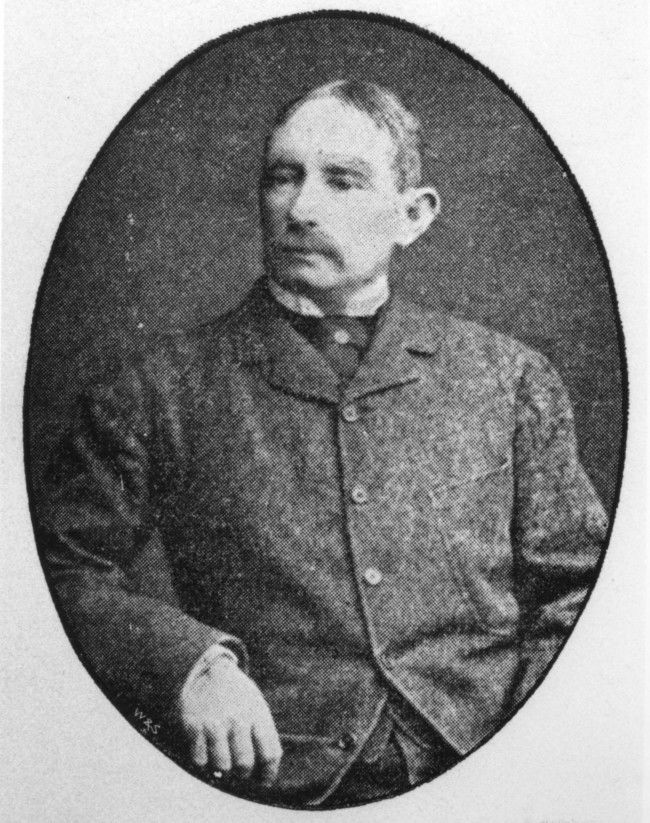
Portrait of Lieutenant-Colonel F A Smith
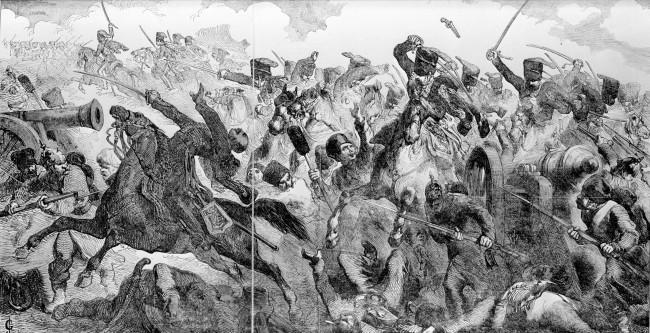
Artist Impression of the Charge of the Light Brigade

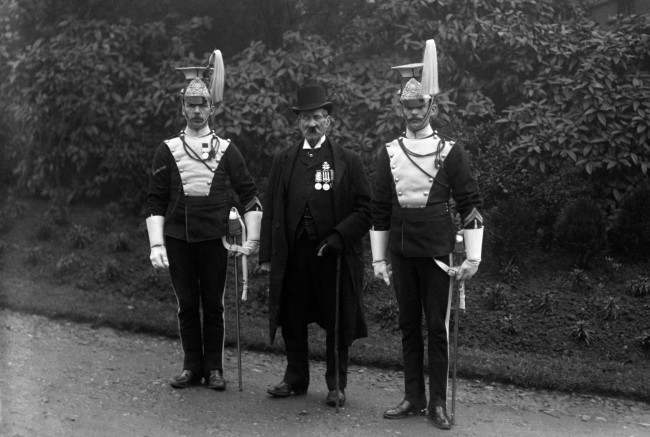
Sergeant James Mustard (80), formerly of the 17th Lancers, flanked by two serving members of the regiment. Mustard (who died on 4th Feb 1916) was the last survivor of the 17th Lancers who took part in the charge of the Light Brigade at the Battle of Balaclava in 1854.
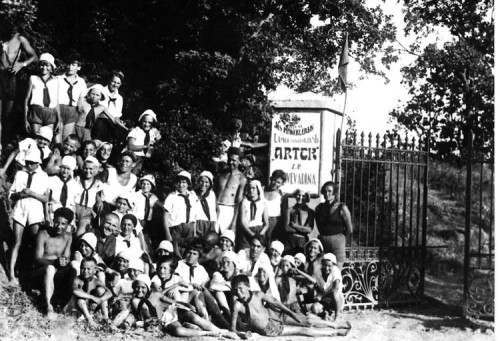
The most famous PR image of the pioneria of the Soviet Union was a summer vacation camp situated in the Crimea (Ukraine), next to Gurzuf town. Founded as a sanatorium for the kids suffering and recovering from the TB by the Russian Society of the Red Cross, it first opened doors in 1925, June 16th, accommodating about 80 kids from Moscow and the nearest Ukrainian towns.
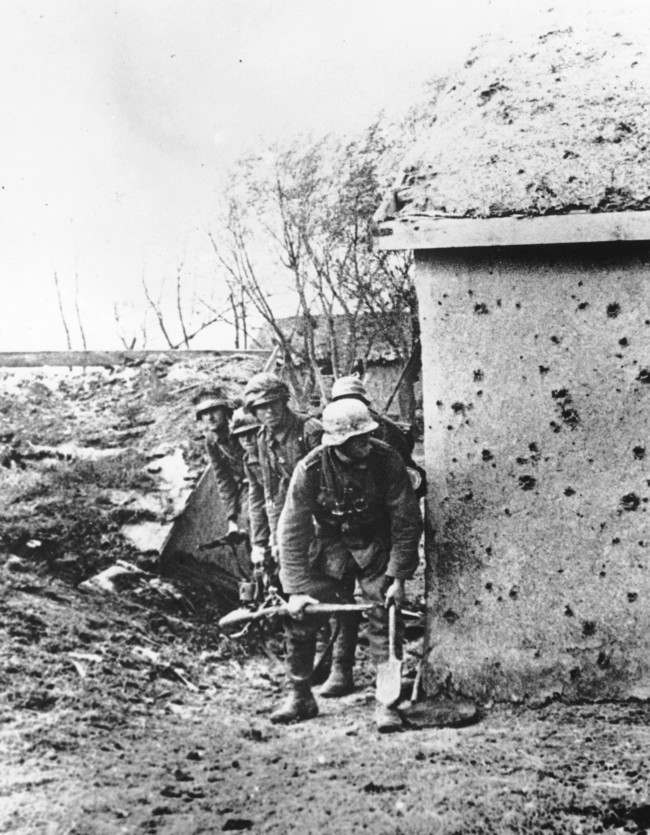
As the German invasion of the Ukraine continues, soldiers of the invading Wehrmacht troops are seen in the cover of a shell-marked wall, at an unknown location on the Crimean peninsula, in November 1941.
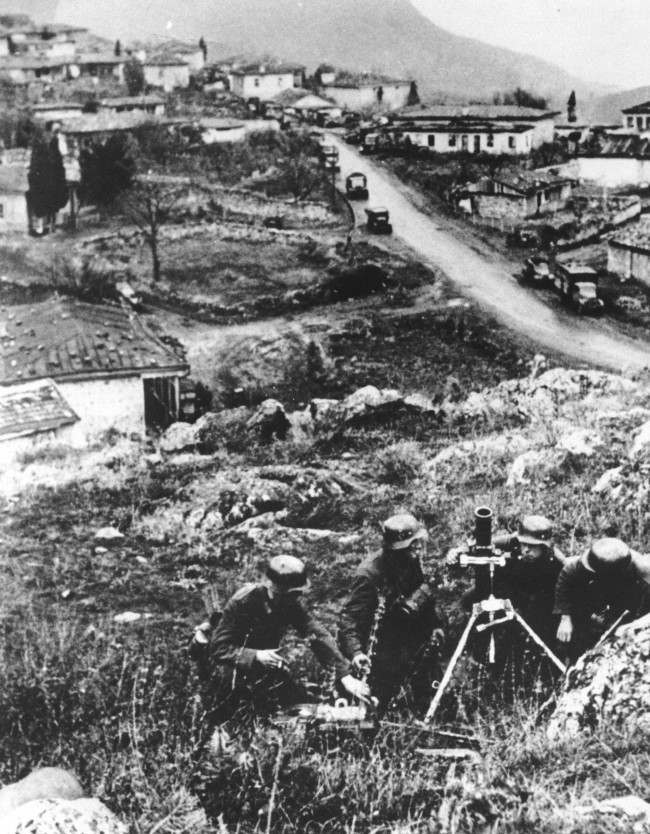
As the German invasion of the southern Ukraine continues, soldiers of an advance division are seen at an unknown village, somewhere between the Crimean Mountains and the Black Sea, on March 12, 1941. A military convoy is moving down a street in the background.
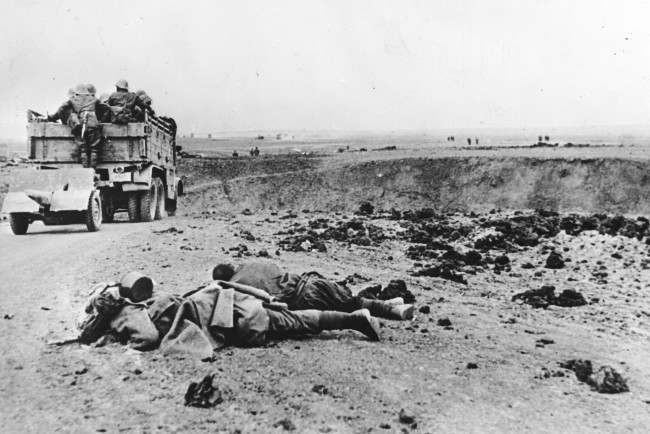
The bodies of two fallen Soviet soldiers lie at roadside, while a truck of the Romanian Army, with an artillery gun in tow, advances towards the city of Kerch, in June 1942, during the Battle of the Crimea in World War II.
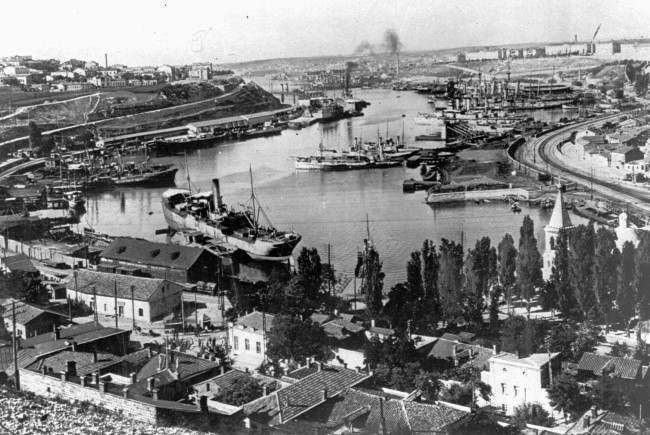
A June 11, 1942 photo of Sevastopol, Black Sea port, naval base and Russian stronghold in the Crimea.
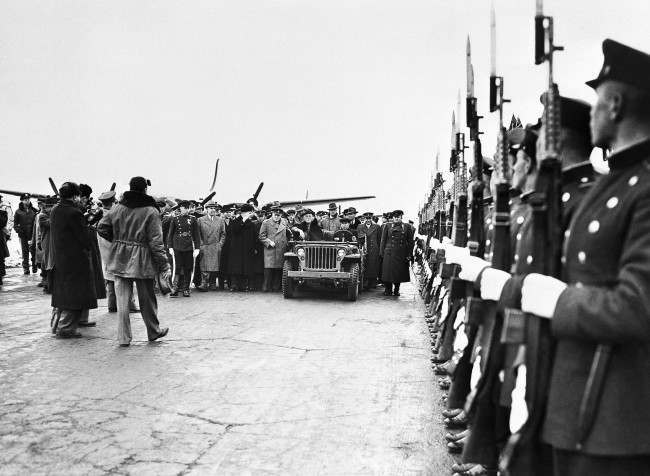
Riding in an American Jeep, President Franklin D. Roosevelt is greeted at the Airport in Yalta, Crimea, Russia, by Russian and British officials with a Russian honor guard at the right on Feb. 12, 1945. In the group at the left of the jeep are: Secretary of State Edward R. Stettinius, Jr. (light coat), Russian Foreign Secretary Vyacheslov Molotov (Arm upraised) and Prime Minister Winston Churchill of Great Britain (light uniform coat, beside the jeep).
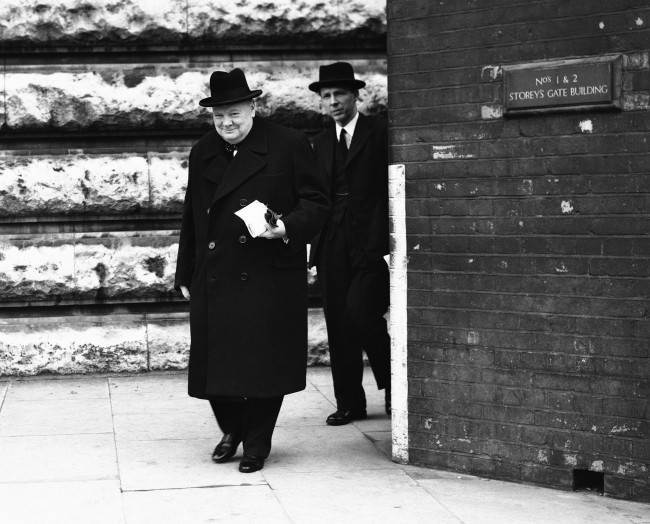
Britain’s Prime Minister Winston Churchill leaving for the House Of Commons, London, to open the 3-day debate on the Crimea conference, on Feb. 27, 1945. His speech is expected to be one of the longest and most informative statements he has yet made.
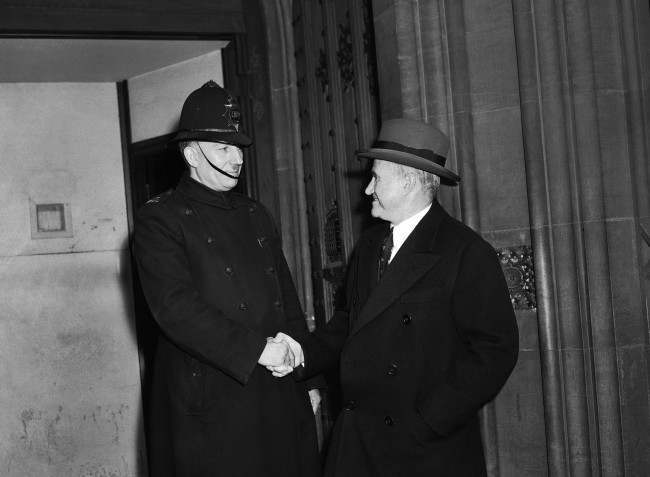
Among those who attended the opening of the 3-day debate on the Crimea Conference at the House of Commons, London, on Feb. 27, 1945, to hear Winston Churchill’s opening speech, was Sam Goldwyn, the American film producer, now visiting this country. Sam Goldwyn shakes hands with the constable on duty at the House of Commons.
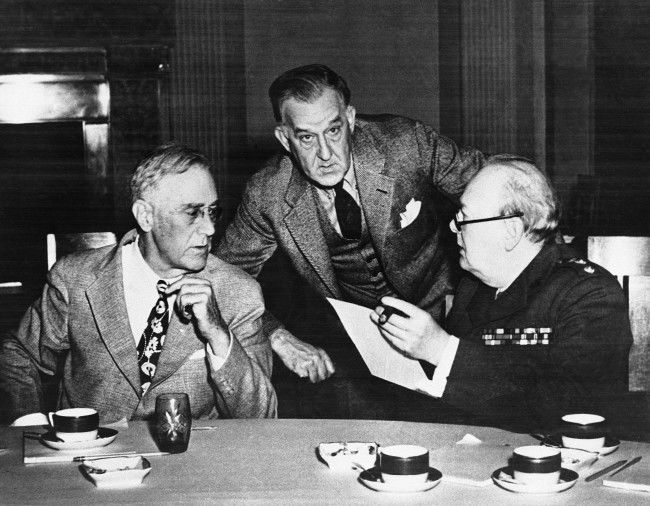
US President Franklin D. Roosevelt, left, confers with British Prime Minister Winston Churchill, right, during luncheon at the Livadia Palace in Livadiya on Feb. 18, 1945, where the Crimea Conference was held. President RooseveltÂs Secretary, Stephen Early, stands in back of the two Allied leaders.
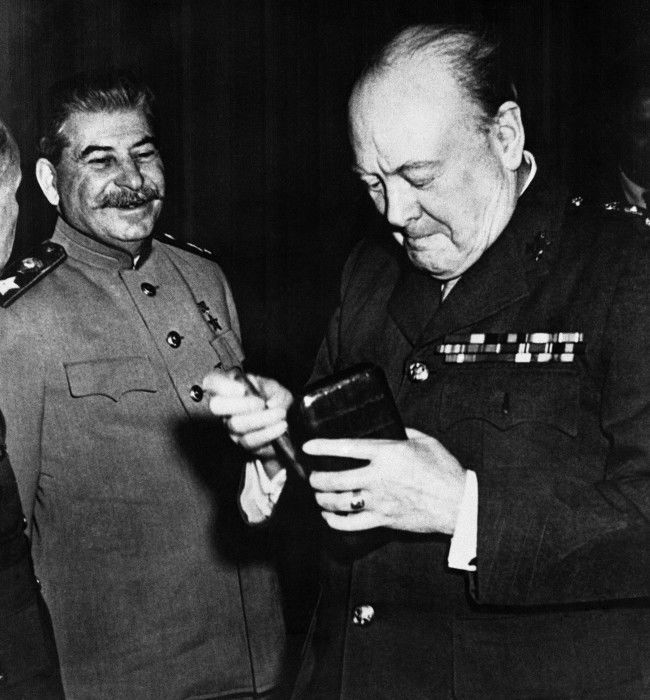
Britain’s Prime Minister Winston Churchill, who takes from his case a fresh cigar as Soviet Marshal Josef V Stalin smiles approvingly between sessions of the Crimea Conference, held at Yalta, Ukraine, on Feb. 17, 1945.
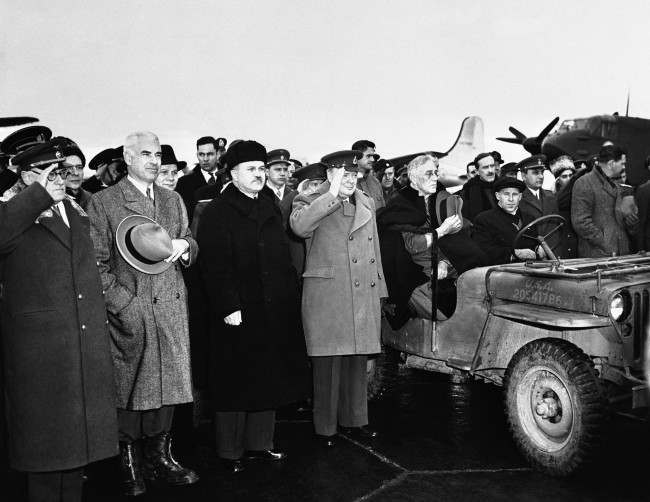
President Franklin D. Roosevelt (right, hat over heart) is greeted at the airport at Yalta, Crimea, Russia, on Feb. 12, 1945, with the playing of the Russian Anthem as he met by Prime Minister Winston Churchill (in uniform beside the president) and Russian Foreign Secretary Vyacheslav Molotov (at left of Churchill) U.S. Secretary of State Edward R. Stettinius, Jr. is at the left of Molotov. The ceremony marked President Roosevelt’s arrival for the “Big Three” conference.
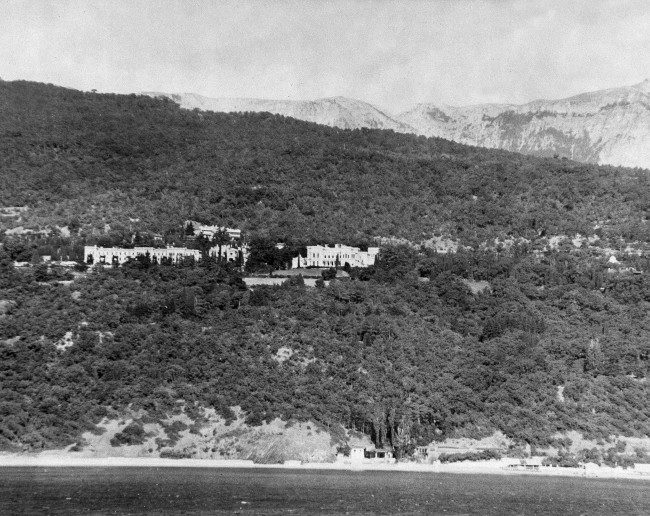
This is the Livadia Palace, center, former summer home of Tsar Nicholas II, Feb. 12, 1945, located about two mile southwest of Yalta, in the Crimea on the Black Sea, where Churchill, Roosevelt and Stalin conferred for eight days.
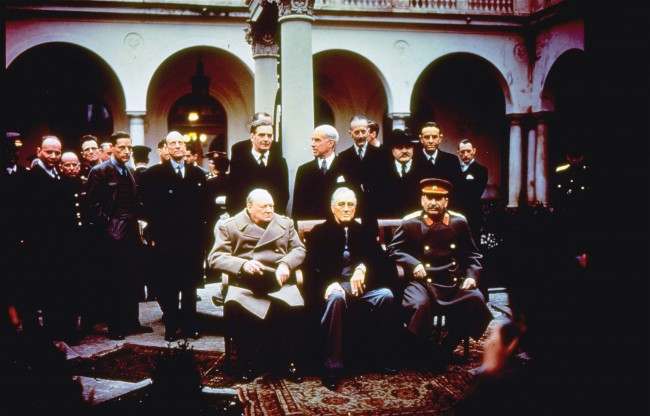
With their foreign secretaries behind them, British Prime Minister Winston Churchill, U.S. President Franklin Roosevelt and Soviet Premier Josef Stalin sit on the patio of Livadia Palace, Yalta, Crimea, Feb. 4, 1945. Standing, from left: Foreign Sec. Anthony Eden, Sec. of State Edward R. Stettinius, and Foreign Commissar Vyasheslav Molotov.
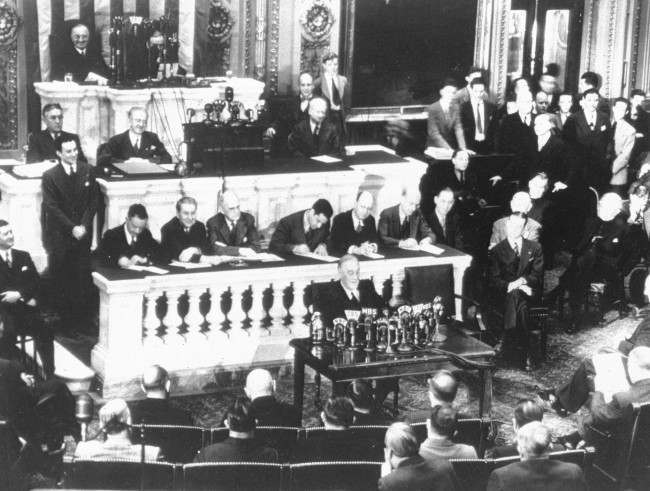
Sitting before a battery of microphones, U.S. President Franklin D. Roosevelt reports to Congress, Washington, DC, March 1, 1945, on the Crimea Conference, between Roosevelt, Britain’s Prime Minister Winston Churchill and Soviet Premier Joseph Stalin, which took place in February at Yalta, Russia. At extreme upper left is U.S. Vice President Harry S. Truman.
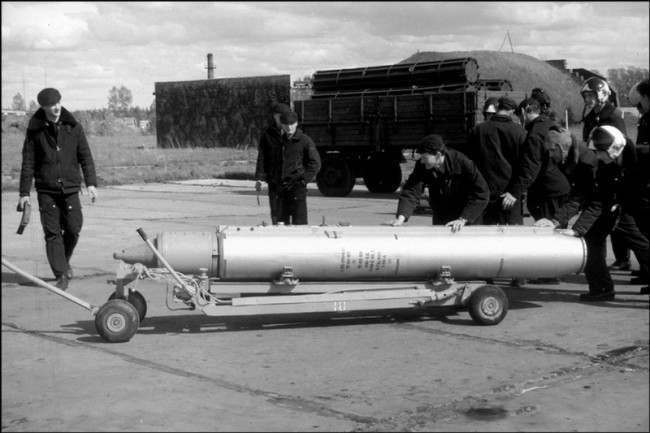
The military airfield Bagerovo is located in a Crimean village not far from Kerch, Ukraine. It was a secret test ground of the air forces that participated in nuclear testing. In 1998 the military unit was disbanded and the airfield with the whole infrastructure was abandoned.

1958
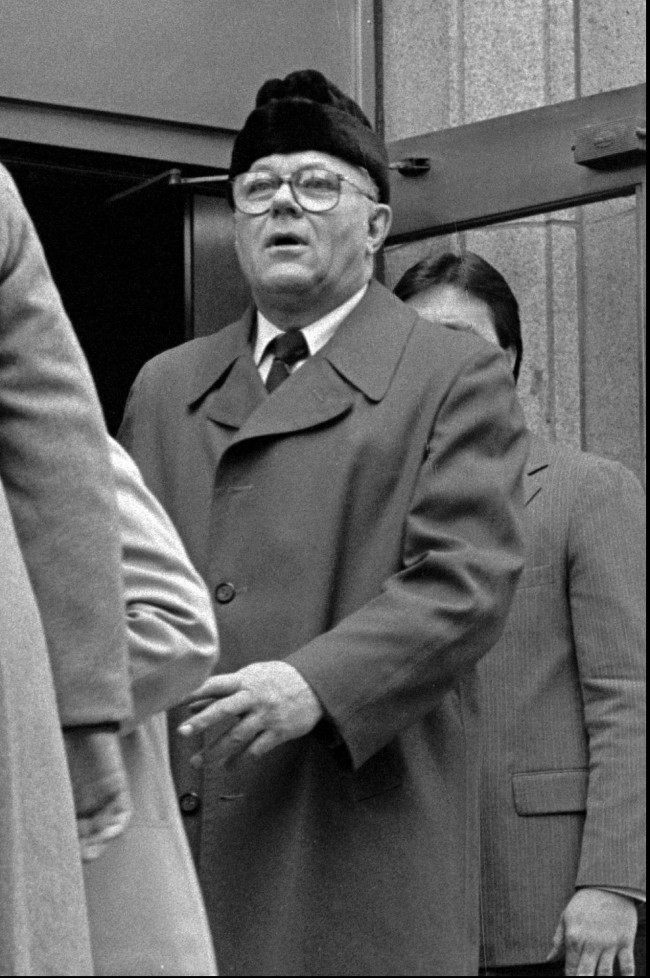
In this 1983 file photo John Demjanjuk, alleged Nazi death camp guard, leaves the federal courthouse in Cleveland. Demjanjuk’s U.S. citizenship was stripped from him in 1981. The Ukrainian-born Demjanjuk was a young Soviet army soldier when he was captured in Crimea in 1942 by the Nazis during World War II. Prosecutors say after that he agreed to serve as a guard and trained at the SS Trawniki camp in Poland before being sent to Sobibor. But Demjanjuk says he was held prisoner for most of the rest of the war and never served as a guard in any camp. The defense will continue its closing arguments Wednesday, and a verdict may come as early as Thursday, May 12, 2011.
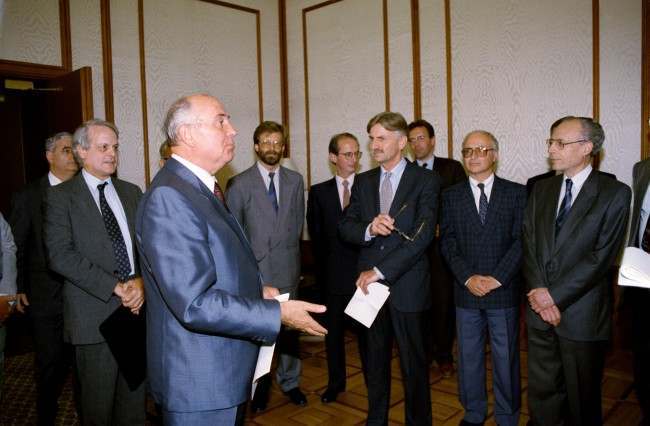
Soviet leader Mikhail Gorbachev speaks with foreign ambassadors in Moscow on Thursday, August 22, 1991, about his house arrest in Crimea during the attempted coup in the Soviet Union.
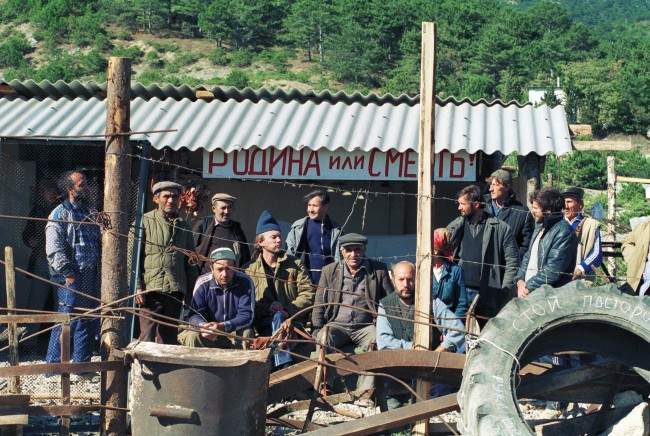
Some of 100 thousand Tatars, (Turkic ethnic group) who returned to their native land, stare from behind a barbed wire fence in a ghetto in Crimea on Sunday, Oct. 30, 1990, which they built with official permission near small village Koreis in Cremea, the slogan reads Motherland or death.
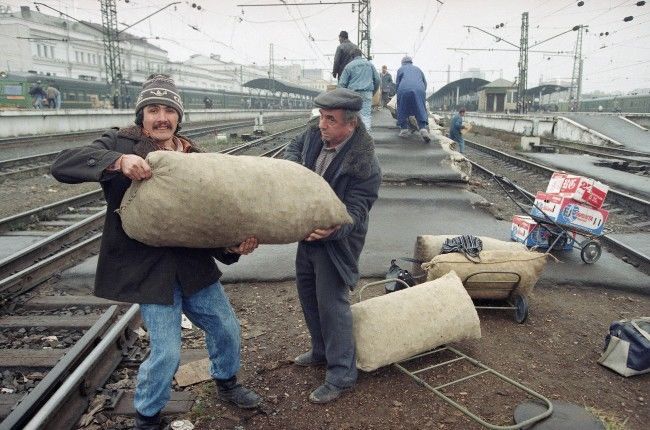
Two Ukrainian farmers from Crimea peninsula region unload sacks with walnuts at the Kurski railway station in Moscow, Oct. 13, 1993. Growers from outside Russia, primarily the Caucasians from Azerbaijan, Georgia and Armenia have faced increasing difficulty selling their goods in Moscow with the state of emergency. Drivers and passengers coming into Moscow must produce local residency papers or face deportation.
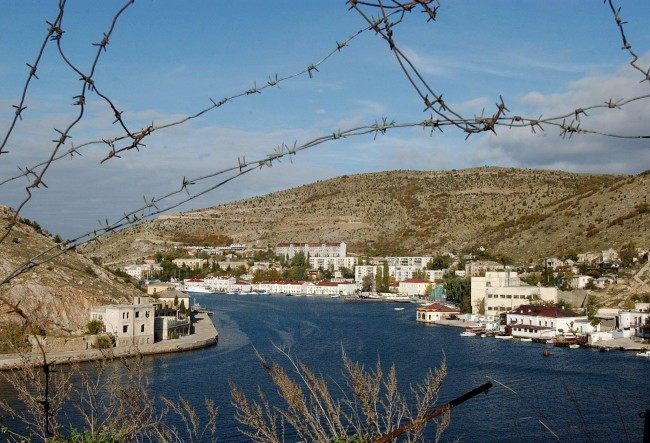
The port of Balaclava in Crimea, where British ships sailed into and anchored as a base for the Crimean war in 1854. On Monday, the 150th anniversary, The Duke of Edinburgh will lay a wreath at a remembrance service at a Balaclava memorial, attended by representatives of the descendant regiments which took part in the charge.
Date: 23/10/2004
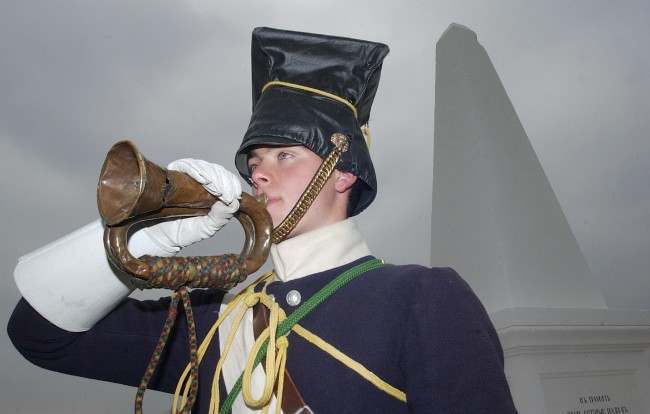
John Hathaway-White 18 year old student from Sutton Coldfield who is studying Music and Russian at Birmingham University, plays the original bugle that was played by Billy Britain to sound The Charge of The Light Brigade, at a memorial service at a British monument for those who lost their lives in The Battle of Balaclava, on the 150th anniversary of The Charge of The Light Brigade, Crimea, Ukraine.
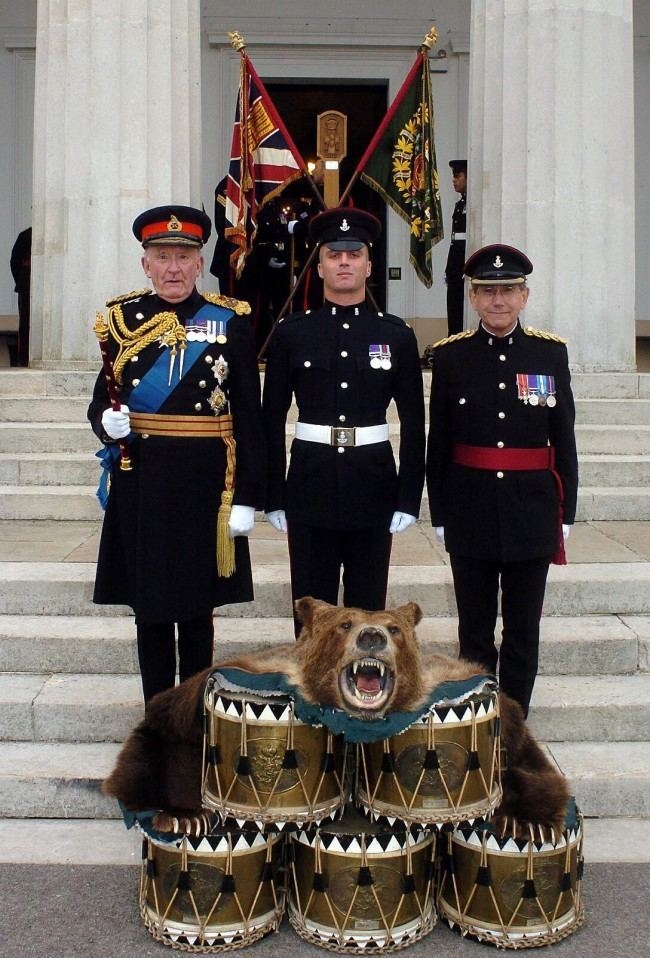
Field Marshall The Lord Inge (left) stands with Private Andrew Davies from Scarborough (centre) and Brigadier John Powell, Colonel of the Green Howards Regiment with drums captured in the Crimea at the Royal Military Academy, Sandhurst, Monday September 19, 2005. Eighteen ranks of serving Green Howard soldiers came together to celebrate the anniversary of their major battle honour, the Battle of Alma during the Crimean War.
Date: 19/09/2005
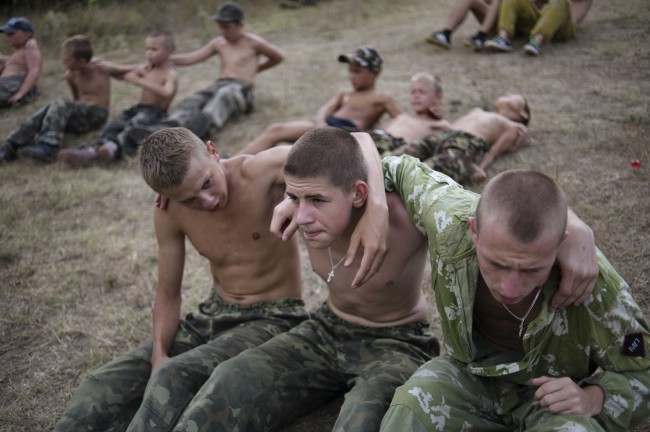
Participants in a youth military camp have training at the camp, some 60 km (38 miles) of Simferopol in the Ukrainian Black Sea Crimean Peninsula, Saturday, Aug. 4, 2012. This summer some 100 boys aged 8-18 from across Russia and Ukraine took part in a youth military camp in Crimea, learning to climb mountains, survive in the woods, shoot various rifles, navigate unknown terrains and conduct reconnaissance trips, all in their name of defending their motherland. The “military patriotic” camp is organized by the Union of CrimeanÂs Cossacks, an ethnic Slavic warrior cast that for centuries defended Russia’s borderlands against invasion and served as the spearhead of Russia’s imperial armies.
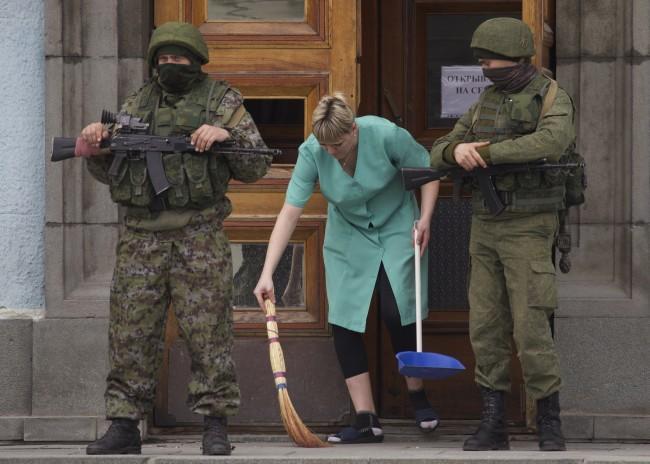
A woman sweeps away the broken glass as two unidentified armed men guard the entrance to the local government building in downtown Simferopol, Ukraine, on Sunday, March 2, 2014. A convoy of hundreds of Russian troops headed toward Simferopol the regional capital of Ukraine’s Crimea region on Sunday, a day after Russia’s forces took over the strategic Black Sea peninsula without firing a shot.
Would you like to support Flashbak?
Please consider making a donation to our site. We don't want to rely on ads to bring you the best of visual culture. You can also support us by signing up to our Mailing List. And you can also follow us on Facebook, Instagram and Twitter. For great art and culture delivered to your door, visit our shop.


